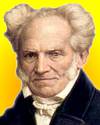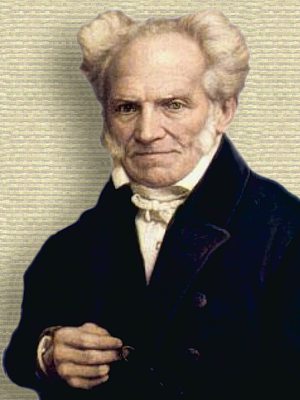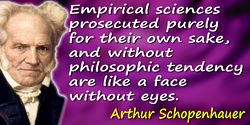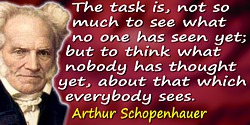 (source)
(source)
|
Arthur Schopenhauer
(22 Feb 1788 - 21 Sep 1860)
German philosopher who was one of the greatest in his era. He made a wide-ranging exploration of “the ever-disquieting riddle of existence.”
|
Science Quotes by Arthur Schopenhauer (14 quotes)
Aber das Leben ist kurz und die Wahrheit wirkt ferne und lebt lange: sagen wir die Wahrheit.
Life is short and truth works far and lives long: let us speak the truth.
Life is short and truth works far and lives long: let us speak the truth.
— Arthur Schopenhauer
Concluding remark in Preface, written at Dresden in August 1818, first German edition, Die Welt als Wille und Vorstellung, 4 Bücher nebst einem Anhange der die Kritik der Kentischen Philosophie (1819), xvi. As translated by Richard Burton Haldane and John Kemp in The World as Will and Representation (1883, 1907), Vol. 1, xv.
Daher ist die Aufgabe nicht sowohl, zu sehen, was noch keiner gesehen hat, als bei dem, was jeder sieht, zu denken, was noch keiner gedacht hat.
The task is, not so much to see what no one has seen yet; but to think what nobody has thought yet, about that which everybody sees.
The task is, not so much to see what no one has seen yet; but to think what nobody has thought yet, about that which everybody sees.
— Arthur Schopenhauer
English translation as given in an Epigraph by Ludwig von Bertalanffy, Problems of Life: An Evaluation of Modern Biological Thought (1952), Vol. 1, (1949, 1952). Original German, at least as early as Schopenhauer and Frauenstädt (ed.), Second Edition of Parerga and Paralipomena (1862), Vol. 2, 116. Quoted in Julius Frauenstädt (ed.) Schopenhauer-Lexikon: Ein philosophisches Wörterbuch, nach Arthur Schopenhauers sämmtlichen Schriften und handschriftlichem Nachlass (1871), 180. This quote has been widely (apparently) incorrectly attributed to Erwin Schrödinger, for example, in Alan L. Mackay (ed.), A Dictionary of Scientific Quotations (1991), 219. Mackay cites Bertalanffy, without page number. Did Schrodinger ever use Schopenhauer’s quote? If you know a primary source for Schrödinger, please contact Webmaster. Prior to this revision on 15 Jun 2015, the quote appeared on this site on the Schrödinger page. This was independently researched by this Webmaster. If you use it elsewhere, first request the credit line and link to include.
Der bis zur Vorrede, die ihn abweist, gelangte Leser hat das Buch für baares Geld gekauft und frägt, was ihn schadlos hält? – Meine letzte Zuflucht ist jetzt, ihn zu erinnern, daß er ein Buch, auch ohne es gerade zu lesen, doch auf mancherlei Art zu benutzen weiß. Es kann, so gut wie viele andere, eine Lücke seiner Bibliothek ausfüllen, wo es sich, sauber gebunden, gewiß gut ausnehmen wird. Oder auch er kann es seiner gelehrten Freundin auf die Toilette, oder den Theetisch legen. Oder endlich er kann ja, was gewiß das Beste von Allem ist und ich besonders rathe, es recensiren.
The reader who has got as far as the preface and is put off by that, has paid money for the book, and wants to know how he is to be compensated. My last refuge now is to remind him that he knows of various ways of using a book without precisely reading it. It can, like many another, fill a gap in his library, where, neatly bound, it is sure to look well. Or he can lay it on the dressing-table or tea-table of his learned lady friend. Or finally he can review it; this is assuredly the best course of all, and the one I specially advise.
The reader who has got as far as the preface and is put off by that, has paid money for the book, and wants to know how he is to be compensated. My last refuge now is to remind him that he knows of various ways of using a book without precisely reading it. It can, like many another, fill a gap in his library, where, neatly bound, it is sure to look well. Or he can lay it on the dressing-table or tea-table of his learned lady friend. Or finally he can review it; this is assuredly the best course of all, and the one I specially advise.
— Arthur Schopenhauer
In Preface, written at Dresden in August 1818, first German edition, Die Welt als Wille und Vorstellung, 4 Bücher nebst einem Anhange der die Kritik der Kentischen Philosophie (1819), xv-xvi. As translated by E.F.J. Payne in The World as Will and Representation (1958, 1969), Vol. 1, xvii. In the preface, Schopenhauer is joking that some readers of his book may find his work does not interest them.
Ihm in vollem Maaße das Schicksal werde, welches in jeder Erkenntniß, … allezeit der Wahrheit zu Theil ward, der nur ein kurzes Siegesfest beschieden ist, zwischen den beiden langen Zeiträumen, wo sie als parador verdammt und als trivial geringgeschätzt wird.
[It] has always fallen to the lot of truth in every branch of knowledge, … [that] to truth only a brief celebration of victory is allowed between the two long periods during which it is condemned as paradoxical, or disparaged as trivial. The author of truth also usually meets with the former fate.
[It] has always fallen to the lot of truth in every branch of knowledge, … [that] to truth only a brief celebration of victory is allowed between the two long periods during which it is condemned as paradoxical, or disparaged as trivial. The author of truth also usually meets with the former fate.
— Arthur Schopenhauer
Conclusion for Preface, written at Dresden in August 1818, first German edition, Die Welt als Wille und Vorstellung, 4 Bücher nebst einem Anhange der die Kritik der Kentischen Philosophie (1819), xvi. As translated by E.F.J. Payne in The World as Will and Representation (1958, 1969), Vol. 1, xvii. In the preface, Schopenhauer is writing his hope that what he has written in the book will be accepted by those it reaches. Notice the statement of three stages of truth: condemnation; acceptance; trivializing. It may be the source of a condensed quote attributed (wrongly?) to Schopenhauer—seen in this collection as the quote that begins, “All truth passes through three stages…”
A genius is one who is endowed with an excess of nervous energy and sensibility.
— Arthur Schopenhauer
Quoted, without citation, in James Wood, Dictionary of Quotations from Ancient and Modern, English and Foreign Sources (1893), 6.
All truth passes through three stages. First, it is ridiculed. Second, it is violently opposed. Third, it is accepted as being self-evident. [Caution: expressed in this wording, it is likely misattributed.]
— Arthur Schopenhauer
Schopenhauer did write a different reflection with this theme, much less tersely, on how the acceptance of truth has “only one short victory celebration is granted between the two long periods where it is despised as paradox and condemned as trivial.” See the Introduction to The World as Will and Representation (1819), xvi. The “three stages” quote is included here so it may be found with this caution: it is questionable that Schopenhauer expressed this idea with this wording. Although widely repeated, Webmaster has not yet found any citation to a primary source for these words. (Schopenhauer was German, so any quote in English represents a translation.) According to Ralph Keys, diligent search by scholars has found no written source in German, either. The sentiment has been variously restated and attributed to other authors. A somewhat better-documented version of the “three stages of truth” is attributed to Louis Agassiz, though still with only second-person references. See Ralph Keyes, The Quote Verifier (2006), 225-226.
Empirical sciences prosecuted purely for their own sake, and without philosophic tendency are like a face without eyes.
— Arthur Schopenhauer
The World as Will and Idea translated by Richard Burdon Haldane Haldane, John Kemp (3rd. Ed.,1888), Vol. 2, 318-319.
Every man takes the limits of his own field of vision for the limits of the world.
— Arthur Schopenhauer
In Arthur Schopenhauer and T. Bailey Saunders (ed., trans.), 'Further Psychological Observations', Studies in Pessimism: A Series of Essays (1891), 69.
Of all the intellectual faculties, judgment is the last to arrive at maturity. The child should give its attention either to subjects where no error is possible at all, such as mathematics, or to those in which there is no particular danger in making a mistake, such as languages, natural science, history, and so on.
— Arthur Schopenhauer
In Arthur Schopenhauer and T. Bailey (ed., trans.) Essays of Arthur Schopenhauer (1902), 67.
Physics is unable to stand on its own feet, but needs a metaphysics on which to support itself, whatever fine airs it may assume towards the latter.
— Arthur Schopenhauer
The World as Will and Representation, trans. E. F. J. Byrne (1958), Vol. 2, 172.
The alchemists in their search for gold discovered other things [of greater value].
— Arthur Schopenhauer
With the phrase “of greater value” in James Wood, Dictionary of Quotations from Ancient and Modern, English and Foreign Sources (1893), 415. The more specific description '—gunpowder, china, medicines, the laws of nature' is given for 'of greater value' in Counsels and Maxims: Being the Second Part of Arthur Schopenhauer's Aphorismen Zur Lebensweisheit translated by Thomas Bailey Saunders (2nd Ed., 1890), 16.
The faculty for remembering is not diminished in proportion to what one has learnt, just as little as the number of moulds in which you cast sand lessens its capacity for being cast in new moulds.
— Arthur Schopenhauer
Religion: a Dialogue, and Other Essays (1890), 99.
The most general survey shows us that the two foes of human happiness are pain and boredom.
— Arthur Schopenhauer
In Arthur Schopenhauer and T. Bailey Saunders (ed., trans), The Wisdom of Life (1897), 23.
When an hypothesis has come to birth in the mind, or gained footing there, it leads a life so far comparable with the life of an organism, as that it assimilates matter from the outside world only when it is like in kind with it and beneficial; and when contrarily, such matter is not like in kind but hurtful, the hypothesis, equally with the organism, throws it off, or, if forced to take it, gets rid of it again entirely.
— Arthur Schopenhauer
In Arthur Schopenhauer and T. Bailey Saunders (ed., trans), The Art of Literature: A Series of Essays (1891), 81.
Quotes by others about Arthur Schopenhauer (5)
I believe with Schopenhauer that one of the strongest motives that lead men to art and science is escape from everyday life with its painful crudity and hopeless dreariness, from the fetters of one’s own ever shifting desires. A finely tempered nature longs to escape from personal life into the world of objective perception and thought; this desire may be compared with the townsman’s irresistible longing to escape from his noisy, cramped surroundings into the silence of high mountains, where the eye ranges freely through the still, pure air and fondly traces out the restful contours apparently built for eternity.
Address at The Physical Society, Berlin (1918) for Max Planck’s 60th birthday, 'Principles of Research', collected in Essays in Science (1934) 2.
I agree with Schopenhauer that one of the most powerful motives that attracts people to science and art is the longing to escape from everyday life.
Quoted, without citation in Bulletin of the Atomic Scientists (Feb 1959), 85. If you know a primary source, please contact Webmaster.
We have no faculties for passing beyond ourselves, yet in ourselves are unfathomed depths, unexplored powers and relations which need fathoming and searching into. As Schopenhauer says, if we would understand nature our course must not only be horizontal, but perpendicular.
In Sir William Withey Gull and Theodore Dyke Acland (ed.), A Collection of the Published Writings of William Withey Gull (1896), li.
In order to give my talk some local color, I wanted to imitate Schopenhauer’s style in my very title. His style distinguishes itself especially by the mode of expression associated in the past with fishwives but which today would be called “parliamentary.”
From Lecture (21 Jan 1905) given to Vienna Philosophical Society, 'On a Thesis of Schopenhauer’s', as translated in John Blackmore (ed.), Ludwig Boltzmann: His Later Life and Philosophy, 1900-1906 (1995), 143.
To go straight to the deepest depth, I went for Hegel; what unclear thoughtless flow of words I was to find there! My unlucky star led me from Hegel to Schopenhauer … Even in Kant there were many things that I could grasp so little that given his general acuity of mind I almost suspected that he was pulling the reader’s leg or was even an imposter.
As quoted in D. Flamm, Stud. Hist. Phil. Sci. (1983), 14, 257.





 In science it often happens that scientists say, 'You know that's a really good argument; my position is mistaken,' and then they would actually change their minds and you never hear that old view from them again. They really do it. It doesn't happen as often as it should, because scientists are human and change is sometimes painful. But it happens every day. I cannot recall the last time something like that happened in politics or religion.
(1987) --
In science it often happens that scientists say, 'You know that's a really good argument; my position is mistaken,' and then they would actually change their minds and you never hear that old view from them again. They really do it. It doesn't happen as often as it should, because scientists are human and change is sometimes painful. But it happens every day. I cannot recall the last time something like that happened in politics or religion.
(1987) -- 


